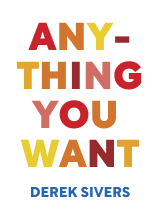

This article is an excerpt from the Shortform book guide to "Anything You Want" by Derek Sivers. Shortform has the world's best summaries and analyses of books you should be reading.
Like this article? Sign up for a free trial here.
Want to know how to develop a business plan that’s simple yet actionable? What do business experts recommend?
Anything You Want author Derek Sivers takes a non-traditional approach to business ownership by centering on honesty, creativity, and humanity. By following his concept of developing a business plan, you can learn how to take small steps toward turning your business dream into a reality.
Read on to learn how to develop a business plan, according to Derek Sivers’s advice.
Developing a Business Plan
A professional musician, Derek Sivers founded CD Baby in 1998 to sell his CDs online when major music companies wouldn’t. What began as an endeavor to address his own unmet need quickly led to Sivers helping friends and other independent musicians sell their CDs online. Sivers sold the successful company in 2008 and put the proceeds into a trust dedicated to music education. He later wrote Anything You Want to share the 40 lessons he learned from being an accidental entrepreneur whose hobby turned into a $22 million business. In this article, we’ll discuss Sivers’s suggestions for how to develop a business plan that can help you put your passions into action.
How to Start Your Plan
Sivers says that great ideas are meaningless if you don’t do something with them and that the best thing you can do to make them a reality is just get started. It’s okay if you don’t have a clear business plan or vision: Sivers had neither when he started CD Baby—he just had a desire to address an unmet need.
Sivers says the most important thing is to not get hung up on everything that could prevent you from pursuing your dream, like a lack of money or fear of something going wrong. Don’t worry about developing the perfect business plan with terms and conditions and legal projections for scenarios that may never unfold. Just keep it simple, don’t overthink, and get started—because taking small steps toward your goal is always better than doing nothing.
| Plan Early and Often Sivers discusses the importance of getting your business started right away so you can put your ideas into action, recommending that you keep things simple and not get bogged down by the details. But some argue that a well-laid-out plan can help you get off on the right foot. To prepare for developing a business plan, here are a few things you should keep in mind: 1. Research your industry and competitors. 2. Identify your audience and mission. 3. Map out your finances. 4. Put together a business plan. 5. Identify mentors and professional support. In addition, it can help to begin with a clear financial strategy, which you can develop by determining whether you plan to self-fund your company, approach investors, or seek loans to get it off the ground. |
Stay Open as You Develop Your Business Plan
As Sivers explains how to develop a business plan, he says that you should stay flexible and open to new ideas and change. He recommends that you design 10 drastically different versions of your plan to explore the various directions you could pursue. This can awaken you to new ways of doing things that would be less apparent if you immediately homed in on a single idea.
For example, if you want to start a business that sells footie pajamas, you could design plans that target a variety of customers (children, teens, adults, or even dogs). You can also explore different ways of distributing your product. Do you want to have an online store, sell at local farmers markets, or have a dedicated space in a mall? Developing a business plan for each scenario challenges you to consider all of the options available to you. In the process, you’ll discover which options get you the most excited, and that’s the direction you should head in.
Lesson illustrated: Sivers learned this technique from one of his vocal coaches—his coach would make him practice a song in several wildly different ways (high, low, fast, slow, slurred, crisp, and so on) to shake him out of his preconceived idea of how the song should sound. He often found that he preferred other versions over his original, and he later connected this lesson to brainstorming business ideas.
| Sivers doesn’t specify how detailed these plans should be, or what a traditional business plan should look like. A basic business plan typically includes the following components: – An executive summary that explains your company’s mission and goals – A description of your company – An analysis of your industry and competitors – An overview of your company’s structure – The service or product you’re offering and its benefits to customers – Your marketing and sales approachA funding request and financial projections |
Sivers asserts that even after you’ve established your business plan, you should remain open to changing it as your company evolves so you can make improvements as needed. He warns that if you get stuck trying to make an idea you love work, but it’s not resonating with people, this can prevent you from discovering other ideas that could lead to your success. You may have many great ideas, but some will never gain traction simply because of factors beyond your control, like timing. So you should keep generating ideas until something lands.
(Shortform note: Many successful business owners agree with Sivers’s advice to stay open to ideas as your business plan develops, and they specifically recommend that you review your plan monthly throughout the lifespan of your business. This will help you stay focused, keep your priorities aligned, and pivot to address changes in the marketplace.)
Lesson illustrated: Sivers says that he reconfigured his business model twice, both times because someone outside his company made an inquiry that prompted him to consider a different and better way to provide his service. In fact, if he hadn’t stayed flexible in his approach, CD Baby would have never become a music store—it would have only been a payment service, similar to PayPal.
Risk Factors to Consider in Your Plan
Aside from learning how to develop a business plan, Sivers also offers some specific advice on avoiding risks when developing your plan:
- Focus your business on the needs of many small customers rather than one or two large ones, so you can stay connected to the interests of the many while distributing risk. He explains that if one person decides to stop using your service, you’ll still have many others.
- Put structures and processes in place from the beginning that will allow you to seamlessly accommodate a doubling of your business, so if that lucky day comes, you won’t be scrambling to meet demand.
- Sign legal agreements with extreme caution so that things you don’t fully understand don’t come back to haunt you later.
(Shortform note: In addition to the risks Sivers presents, experts advise you to consider financial perils. For example, most businesses don’t see a profit for the first 18-24 months, so you might have to make personal financial sacrifices to keep your business afloat. This financial strain can cause your physical and mental health to suffer, so you should go into your business with open eyes and a plan for how to handle financial uncertainty. One suggestion is to establish a cash reserve of at least four to six months of business expenses right from the start.)

———End of Preview———
Like what you just read? Read the rest of the world's best book summary and analysis of Derek Sivers's "Anything You Want" at Shortform.
Here's what you'll find in our full Anything You Want summary:
- How to turn your hobby into a successful business
- A non-traditional approach to business ownership
- How to integrate honesty, creativity, and humanity into your business model






